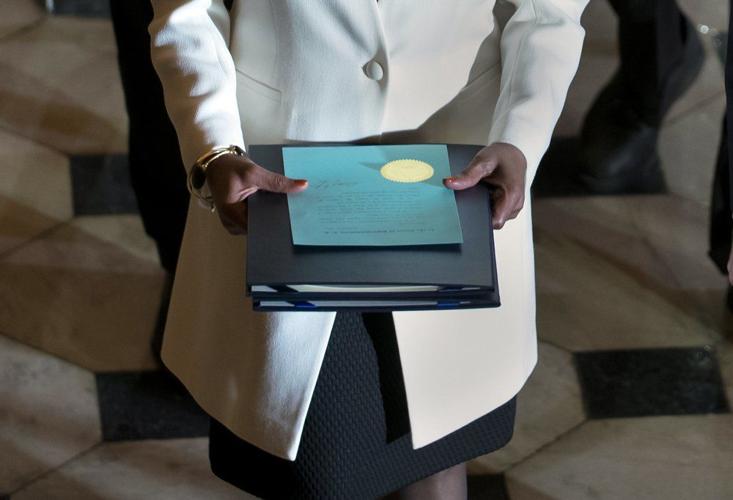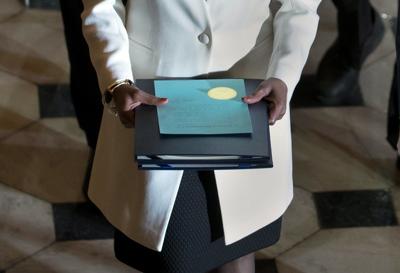LOUISVILLE, Ky. (WDRB) – North Oldham High School teacher Craig Grimm stood at the front of his class on Wednesday and rattled off the names of sitting U.S. senators as casually as a baseball fan reciting his favorite team's batting order.
Grimm's advanced placement government and politics classes have been closely watching the drama in Washington, D.C., surrounding the impeachment of President Donald Trump, and the Senate had just received the formal charges against Trump from the House of Representatives.
Grimm highlighted where things stood ahead of a Senate trial into allegations that Trump purposefully withheld millions of dollars in aid to Ukraine on the condition that the country's leaders investigate Democratic presidential candidate Joe Biden and his son Hunter, who worked for a Ukrainian energy company.
"We talked a little bit yesterday about the Republican senators that were pushing hard for witness testimony in that Senate trial," Grimm said. "That number is growing, so be paying attention to that as well. (Lisa) Murkowski is now on board with that. (Mitt) Romney is on board, and … Susan Collins from Maine."

Craig Grimm discusses the ongoing impeachment saga during his advanced placement government and political class at North Oldham High School on Jan. 15, 2020.
It's just the third impeachment of a sitting president in U.S. history, making the seminal event impossible for high school history and civics teachers to ignore.
"Because it's so prevalent in the news right now, you can't go anywhere or listen to anything without it coming up," Grimm said.
In an increasingly polarized political environment, the challenge for teachers is to have productive discussions about the impeachment without their classrooms devolving, as Grimm put it, into "a situation where kids are barking back and forth at each other."
Educators who spoke to WDRB News said they try to place the impeachment proceedings within the broader context of U.S. civics.
"A lot of kids believe that impeachment means removal, and they are surprised that there actually is a trial component of the impeachment process," said Suzie Moss, a Floyd Central High School teacher with 27 years of experience. "It will be a teachable moment, I think, throughout this whole process."

President Donald Trump and first lady Melania Trump arrive for the College Football Playoff National Championship game between LSU and Clemson, Monday, Jan. 13, 2020, in New Orleans. (AP Photo/ Evan Vucci)
For Grimm, the situation facing Trump provides an opportunity for his classes to learn not just how Congress is handling the impeachment, but also how that process has been used in the past to force dozens of other officials besides the president from office.
Impeachment in the U.S. dates back to the founding of the country, a point that Grimm emphasizes by noting that two federal judges appointed by George Washington were impeached and one was successfully removed from the bench.
Federal officials have been impeached for missteps such as tax evasion, bribery, drunkenness and political bias, he said. U.S. Sen. William Blount of Tennessee was the first person to be impeached in 1797 for allegedly conspiring to help Great Britain seize parts of Florida and Louisiana, which were Spanish territories at the time. He was expelled from the Senate before the upper chamber could try him.
"We've initiated impeachment 62 times," Grimm said. "Articles of impeachment have been drafted 20 times. We've never officially impeached and removed a Supreme Court justice; we've never removed a president, but as a country we're impeaching federal individuals on an average of one every four years, and I don't think we understand that."

The politics of impeachment are nothing new, Grimm emphasizes in his lessons.
"Founding fathers used it really liberally," Grimm said. "I don't mean that ideologically. They were just very liberal with impeachment because they wanted the power to reside in the legislature. It's the first article in the Constitution on purpose. They wanted it to be the most dominant branch."

Providing historical context and giving students a comfortable environment to discuss hot-button issues like impeachment can help them become more civic-minded members of society, said Sigal Ben-Porath, a professor of education, political science and philosophy at the University of Pennsylvania.
Exposing students to different ideological perspectives is critical to that endeavor, Ben-Porath said. She suggests educators who teach subjects other than history or government to think of ways to incorporate the current impeachment proceedings into their lessons.
"A lot of the exposure to diverse opinions may not be intended to persuade students or others to change their minds," Ben-Porath said. "… The main goal is for us to be able to understand and respect our differences."
That can be difficult, however, given how politically polarized society has become and how homogenized ideologies can be in different communities, she said.
"If we're unable to bridge across our differences and listen to each other respectfully, then we see the kind of polarization that we're seeing now grow and expand," Ben-Porath said. "Schools are actually a very productive context where you have long-term relationships and you have an investment in facts and ideas and engagement around them. These are places where you can make the time in the right context to engage that can help us launch the next generation of citizens into a less polarized society."
And if teachers in middle and high schools are comfortable enough and set respectful parameters for discussion, Ben-Porath encourages them to offer their personal political views as they talk about impeachment.
At the very least, she said teachers can present different perspectives to get their students thinking about varied political views.
"If the class is of one mind, the teacher might actually be well advised to say, 'Look, maybe I even share your opinions, but here is a thoughtful counterargument,'" she said.

Senate Majority Leader Mitch McConnell, R-Ky., walks to talk with reporters outside of the Senate chamber, on Capitol Hill in Washington, Tuesday, Jan. 14, 2020. (AP Photo/Jose Luis Magana)
Grimm said he often plays "devil's advocate" to challenge his students' thinking.
"If you're going to think it and you're going to say it, you better be ready to back it up, and that goes for me, too," Grimm said. "My students will challenge me right back when I say something that's opinion-based, and they'll ask questions or they'll provide their own perspective, and I want them to have that opportunity."
Some of his students said Grimm's frequent challenges have helped shape their perspectives on impeachment.
He also stresses the importance of finding credible sources – that don't originate on social media – to his students and has them analyze coverage from conservative, liberal and neutral news outlets.
"He definitely tells both sides, good or bad," said Molly Conway, a junior at North Oldham. "If you make a point, he'll definitely try to refute it, make sure you know what you're talking about."
Moss, the Floyd Central teacher, said it's important to maintain a respectful setting for students to share their perspectives on the impeachment issue.
"I think when you establish that kind of environment in the classroom, it really leads to great debates and great discussions among students," she said.

Grimm recommends that teachers who are unsure of how to approach the polarizing subject reach out to more experienced colleagues for guidance.
Grimm also teaches advanced placement psychology, and some students in those classes have asked him questions about Trump's impeachment. He always has a few minutes to answer their questions about the latest developments.
"Sometimes I'll use my (government) conversations to generate ideas on how to connect the other students in other classes," he said. "I know a lot of other teachers are doing the same thing."
Copyright 2020 by WDRB Media. All rights reserved.


















